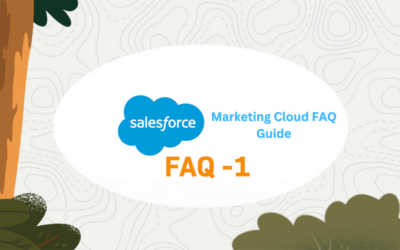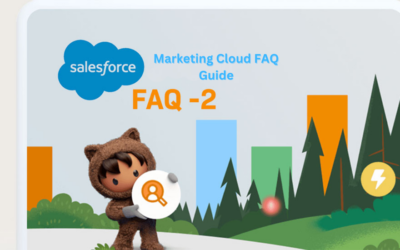In the fast-paced realm of e-commerce, the ability to effectively engage with customers and drive conversions is paramount to success. Salesforce Marketing Cloud, a versatile and comprehensive platform, stands as a beacon for e-commerce businesses seeking to elevate their marketing efforts. This guide is a deep dive into the world of Salesforce Marketing Cloud, designed to unravel its intricate technical aspects and provide invaluable insights. Over the following chapters, we will explore the intricacies of this platform, from its robust email marketing capabilities to its sophisticated social media management tools, and from the art of customer journey mapping to the science of data analytics. Our goal is to empower e-commerce professionals with the knowledge and technical prowess needed to harness the full potential of Salesforce Marketing Cloud and achieve remarkable results in an ever-evolving digital landscape.
Within these digital pages, you’ll discover not only the fundamental components of Salesforce Marketing Cloud but also the technical nuances that set it apart as a powerhouse in the e-commerce marketing arena. We’ll delve into the finer details of email marketing, dissecting the features that allow for personalized campaigns and sophisticated automation. We’ll navigate the terrain of multi-channel engagement, showcasing how Salesforce Marketing Cloud seamlessly orchestrates customer interactions across various digital touchpoints. Moreover, we’ll uncover the data-driven backbone of this platform, unveiling the analytical tools that empower businesses to make informed decisions. So, if you’re ready to embark on a journey that leads to e-commerce excellence through Salesforce Marketing Cloud, let’s dive in. If you need assistance with Salesforce CRM setup and optimization, companies like CRM Force can provide valuable expertise and support.
1- Understanding Salesforce Marketing Cloud
Email Marketing:
Salesforce Marketing Cloud offers a robust email marketing platform that allows you to create, personalize, and automate email campaigns. It provides features like drag-and-drop email builders, dynamic content insertion, and A/B testing capabilities. Advanced users can utilize AMPscript, a scripting language, to create highly customized email content.
Social Media Management:
Salesforce Marketing Cloud’s Social Studio is integrated into the platform, enabling you to manage your social media presence effectively. You can schedule posts in advance, monitor social media conversations, and even collaborate with your team members. The platform’s powerful social listening capabilities allow you to track brand mentions and gather valuable insights into customer sentiment.
Customer Journey Mapping:
Salesforce Marketing Cloud’s Journey Builder is a visual tool that lets you design and automate customer journeys. It uses decision splits and triggers to send personalized messages and content based on customer interactions. This can include email opens, website visits, or purchases. Journey Builder is highly versatile, allowing you to create complex, multi-step customer journeys with ease.
Data Analytics:
Data analytics in Salesforce Marketing Cloud is essential for measuring the effectiveness of your campaigns. You can create custom reports and dashboards to track key performance indicators (KPIs) such as click-through rates, conversion rates, and revenue generated. Additionally, Marketing Cloud’s Einstein Analytics provides advanced AI-driven insights, helping you identify trends and make data-driven decisions.
2- Benefits of Salesforce Marketing Cloud for E-commerce
Personalization:
Salesforce Marketing Cloud excels in personalization through its Audience Builder. It allows you to segment your audience based on various criteria, such as demographics, past purchases, or website behavior. You can then use these segments to tailor your marketing messages and product recommendations, delivering a personalized experience to each customer.
Multi-Channel Engagement:
Salesforce Marketing Cloud’s multi-channel capabilities are powered by the Journey Builder. This tool enables you to orchestrate seamless, multi-channel customer experiences. For example, you can start a customer journey with an email, follow up with a personalized social media ad, and then trigger an SMS message based on specific actions taken by the customer. This level of coordination across channels can significantly improve engagement.
Automation:
Automation is at the core of Salesforce Marketing Cloud. Automation Studio allows you to schedule and automate various marketing tasks, such as sending out email campaigns, nurturing leads, and managing data imports and exports. By automating repetitive tasks, you can save time and ensure consistent messaging to your audience.
Data-Driven Decision-Making:
Salesforce Marketing Cloud’s analytics tools provide deep insights into your e-commerce business. You can set up conversion tracking to measure the ROI of your marketing campaigns accurately. Additionally, Marketing Cloud’s integration with Salesforce CRM enables you to connect customer data from various touchpoints, creating a holistic view of your customers’ interactions and preferences.
3- Tips and Tricks for E-commerce Success
Master Segmentation:
Salesforce Marketing Cloud’s Segmentation Builder allows you to create dynamic segments that update in real time based on customer behavior. Utilize SQL queries for advanced segmentation criteria. You can then use these segments as target audiences for personalized emails, ensuring that your messaging is highly relevant.
Implement Abandoned Cart Emails:
To set up abandoned cart emails effectively, use Automation Studio to create automation flows triggered by abandoned cart events. Utilize personalized product recommendations in these emails to entice customers to complete their purchases. Ensure the timing of these emails is optimized to recover as many abandoned carts as possible.
Leverage Predictive Analytics:
Salesforce Einstein’s predictive analytics can help you identify high-value leads and predict future customer behavior. Incorporate predictive scores into your lead nurturing strategies, ensuring that your sales team focuses their efforts on the most promising prospects.
A/B Testing:
Salesforce Marketing Cloud’s A/B testing capabilities, available for both email and SMS campaigns, allow you to experiment with different elements of your messages. Test variables like subject lines, email content, and call-to-action buttons to determine which versions resonate best with your audience. Use the results to refine your future campaigns.
Monitor Social Media Engagement:
Use Social Studio within Salesforce Marketing Cloud to monitor social media engagement effectively. Set up social listening queries to track mentions of your brand or products. Analyze the engagement metrics to understand what content resonates with your audience and adjust your social media strategy accordingly.
Personalize Product Recommendations:
Leverage predictive product recommendations using Salesforce’s Commerce Cloud integration. Utilize algorithms that analyze customer behavior and preferences to display personalized product suggestions on your e-commerce website. These recommendations can significantly increase cross-selling and upselling opportunities.
Incorporating these technical insights and tips into your Salesforce Marketing Cloud strategy can help you supercharge your e-commerce efforts and achieve remarkable results. Remember that continuous optimization and adaptation to your unique audience are key to sustained success in the ever-evolving e-commerce landscape.
Conclusion
In conclusion, Salesforce Marketing Cloud emerges as an indispensable asset in the arsenal of e-commerce businesses striving for unparalleled marketing success. Its multifaceted features, ranging from the intricacies of email marketing and social media management to the art of crafting personalized customer journeys and data-driven analytics, empower marketers to engage with their audiences in ways that were once inconceivable. The technical insights and strategies explored throughout this guide shed light on the true potential of Salesforce Marketing Cloud, providing e-commerce professionals with the tools they need to thrive in a competitive digital landscape.
As you embark on your journey to e-commerce excellence, remember that the synergy of technical proficiency and creative strategy is the true recipe for success. Salesforce Marketing Cloud not only empowers you with the means to analyze data and automate campaigns but also invites you to innovate, adapt, and personalize your approach to each individual customer. By mastering the technical intricacies of this platform and embracing the ever-evolving landscape of digital marketing, you’ll position your e-commerce business for sustained growth, engagement, and success. With these insights in hand, the horizon of possibilities with Salesforce Marketing Cloud stretches infinitely, inviting you to embark on a journey of continuous improvement and e-commerce triumph. To learn more about how CRM Force can assist you in recruiting top CRM talent and optimizing your CRM strategies for successful drip campaigns, contact us today. Together, let’s maximize your customer engagement Contact Us today.





